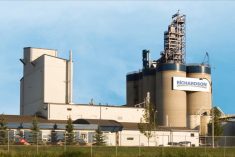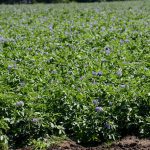MarketsFarm — Concerns over the likelihood of a much smaller canola crop than previously anticipated, coupled with a very tight supply situation, continued to underpin values this week.
That price rationing in turn has kept canola more expensive than other edible oils, according to trader Keith Ferley of RBC Dominion Securities in Winnipeg.
“The market is trying to come to grips with what’s the yield and how small the crop is going to be,” he said.
With the drought across the Prairies this year, it’s a foregone conclusion this year’s canola production will come up short of the 20 million tonnes initially forecast. More recent estimates pegged the crop at 15 million to 17 million tonnes, but anecdotal reports of poor yields could see a harvest down to 14 million or 13 million, maybe less.
Read Also

U.S. livestock: Feeder cattle hit contract highs on tight supply
Chicago | Reuters – All Chicago Mercantile Exchange feeder cattle futures and most live cattle futures hit contract highs on…
Statistics Canada doesn’t issue its survey-based principal field crops report until Aug. 30. That will be followed by the agency’s satellite-based report a month later.
“We know we’re way overpriced. The problem is we don’t have enough eggs in the basket for everybody who wants to have an egg,” Ferley said.
Some of the reports on the canola harvest Ferley has heard from farmers have included yields of a mere five to six bushels per acre — enormously lower than the 32.85 bu./ac. at which the U.S. Department of Agriculture (USDA) pegged the Canadian oilseed in its supply and demand estimates last week.
“My clients say there’s no way we’re going to average that across Western Canada,” Ferley said, noting some canola fields have been abandoned while others have been baled — a rarity on the Prairies.
In most years, he said, there are Prairie fields that churn out up to 60-70 bu./ac., which brings the regional average up to 40-45 bu./ac. — and that isn’t going to happen this year.
Besides the uncertainty of canola yields, Ferley said there hasn’t been a lot of farmer selling lately.
Historically, growers forward-sell their crops just as they’re being planted. With the drought, they’re going to be a situation where they have sold more than what they will combine.
— Glen Hallick reports for MarketsFarm from Winnipeg.

















